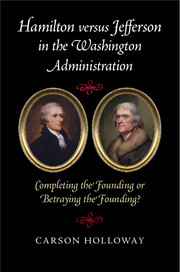 Hamilton versus Jefferson in the Washington Administration
Hamilton versus Jefferson in the Washington Administration Book contents
- Frontmatter
- Dedication
- Contents
- Acknowledgments
- 1 Introduction
- PART I A DEBATE BETWEEN CABINET COLLEAGUES
- PART II A CLASH OF RIVAL PARTY LEADERS
- 7 Securing American Independence: Hamilton's Report on Manufactures
- 8 The Revolution, Alienation of Territory, and the Apportionment Bill
- 9 Aiming for Monarchy: Jefferson's Critique of Hamiltonianism
- 10 Tending toward Anarchy: Hamilton's Critique of Jeffersonianism
- PART III Founding Foreign Policy
- Index
10 - Tending toward Anarchy: Hamilton's Critique of Jeffersonianism
from PART II - A CLASH OF RIVAL PARTY LEADERS
Published online by Cambridge University Press: 05 November 2015
- Frontmatter
- Dedication
- Contents
- Acknowledgments
- 1 Introduction
- PART I A DEBATE BETWEEN CABINET COLLEAGUES
- PART II A CLASH OF RIVAL PARTY LEADERS
- 7 Securing American Independence: Hamilton's Report on Manufactures
- 8 The Revolution, Alienation of Territory, and the Apportionment Bill
- 9 Aiming for Monarchy: Jefferson's Critique of Hamiltonianism
- 10 Tending toward Anarchy: Hamilton's Critique of Jeffersonianism
- PART III Founding Foreign Policy
- Index
Summary
Writing from Mount Vernon on July 29, 1792, Washington sent Hamilton, “in strict confidence, and with frankness and freedom,” a letter on an “interesting and important subject.” This subject was Jefferson's critique of Hamilton's system, which Washington provided for the secretary of the treasury almost word for word. The president did not, however, reveal Jefferson as the author, but instead presented the critique as having been discovered by him as a result of his efforts, during his trip home and since his arrival there, to learn “the sentiments which are entertained of the public measures.”
Washington's introduction suggested that he did not take all the points of Jefferson's critique with equal seriousness. Some of the complaints, he indicated, came from “sensible and moderate men– known friends to the government,” who agreed that the nation was “prosperous and happy,” but who were nevertheless “alarmed at that system of policy, and those interpretations of the Constitution, which have taken place in Congress.” Other criticisms he attributed to other men, such as George Mason, “less friendly perhaps to the government, and more disposed to arraign the conduct of its officers.” While Washington may have regarded some aspects of the critique as more “sensible” than others, he nevertheless took the whole seriously enough that he wanted Hamilton's response. Aiming only to “obtain light and to pursue truth,” and “wishing” for “explanations as well as complaints on measures” which involved the “public interest, harmony and peace” as well as his own “public conduct,” Washington asked for Hamilton's “ideas upon the discontents” to be “enumerated” in what followed.
Hamilton's Defense of his Policies
Hamilton answered Washington on August 18 with a lengthy, point-by-point reply to the concerns that had been raised. He titled his report “Objections and Answers respecting the Administration of the Government.” In the accompanying letter, Hamilton admitted that the report contained at certain points “some severity” of tone. This arose, Hamilton said, because the critique Washington had forwarded included not only “imputations of error of judgment” on Hamilton's part but also “calumnies” upon his character as the “principal agent in the measures censured.” He could not, he said, be “entirely patient” in the face of “charges which impeach the integrity of my public motives or conduct,” feeling as he did that he deserved them “in no degree.”
- Type
- Chapter
- Information
- Hamilton versus Jefferson in the Washington AdministrationCompleting the Founding or Betraying the Founding?, pp. 165 - 204Publisher: Cambridge University PressPrint publication year: 2015


